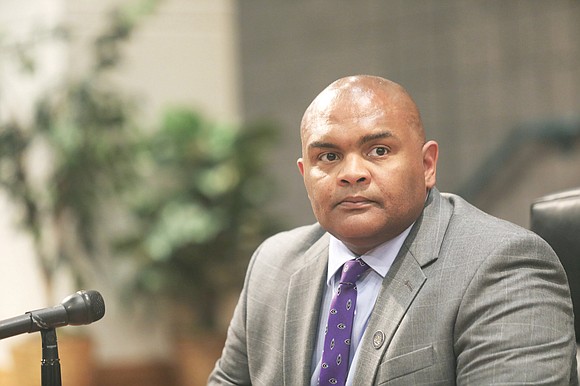Chief Smith embraces police reform, but wants to control it from the catbird seat
Jeremy M. Lazarus | 7/16/2020, 6 p.m.

New Richmond Police Chief Gerald M. Smith is raising a yellow caution flag for those pushing to reform the department and support budget cuts to “defund the police.”
In his first news conference since taking the helm July 1, Chief Smith told reporters Tuesday that he and ranking officers would need to play a major role in any discussion of reforms or budget reductions and that he would have to have the final say on putting recommendations in place.
“We are the professionals,” Chief Smith said. “We are the ones who know how the profession works, what will work, what the rate of change can be and how fast it should go.”
Chief Smith, 51, served 29 years with the Charlotte-Mecklenburg Police Department in North Carolina before taking the Richmond job. He is still learning the Richmond police force while trying to build up the sagging morale of front line officers and getting out in the community so people can get to know him.
He said he is not opposed to vigorous discussion of police reform, and sees that it likely will take place because of Mayor Levar M. Stoney’s newly appointed, 24-member Task Force to Reimagine Public Safety. The task force, which includes a retired police officer and two current officers, is charged with coming up with recommendations for reforming police operations.
A protégé of former Richmond Police Chief Rodney Monroe, Chief Smith said he plans to set up his own external and internal committees to consider proposals for departmental improvement, which he said he would push just as he did in Charlotte. He noted he led a successful effort there to overhaul police recruiting to improve diversity.
Still, he already embraces some reforms — most notably creating better connections with health professionals as part of the fight against crime and creation of a civilian oversight board with subpoena powers to investigate alleged police misconduct.
He said in Charlotte, which has a police oversight board without subpoena power, both the board and the department often were frus- trated that complainants couldn’t be compelled to testify. Often, if hearings were held, “it would show what an officer did right,” he said. The lack of subpoena power prevents such information from being heard by the public.
Mayor Stoney selected Chief Smith to take charge of Richmond’s beleaguered police depart- ment that is under fire for its actions and failure to prevent damage during weeks of protests against police violence and racial injustice since the May 25 killing of George Floyd at the hands of police in Minneapolis. The Richmond Police Department is facing multiple lawsuits stemming from local actions against protesters.
Chief Smith said he would oppose cutting the department’s budget to shift money elsewhere.
“Defund the police is the wrong issue,” he said. “We need to seek to fund the change we are seeking. If there is an education gap, fund to close that gap. If there are health disparities, fund that.”
He said the department will not become more effective with less money. He noted the current budget is essentially “set in stone,” taking effect on July 1, the day he arrived. At this point, City Council has no control over police spending; only the mayor can propose budget amendments.
He also noted that those decrying police spending may find the police department could need “more dollars, not less” to accomplish what is being sought.
An outbreak of violence not connected with the protests buttresses Chief Smith’s claims about department needs. Just hours after the news conference, officers responded to a spate of five shootings between Tuesday evening and early Wednesday morning in North Side, Church Hill and South Side that left two people dead and four others wounded, including two girls ages 3 and 6. One of the deaths was that of a 15-year-old boy.
The violence has refocused attention on police coverage and whether there are enough officers to ensure public safety. The department reports having 677 officers available for duty out of the 734 currently on the roster.
City Councilman Michael J. Jones, 9th District, and Councilwoman Stephanie A. Lynch, 5th District, have become leading advocates for police reform along with Mayor Stoney. The two are pressing City Council to have the administration ban the use of tear gas, rubber bullets and pepper spray for crowd control. Both remain upset over what they saw as the police department’s overly aggressive use of those methods against peaceful demonstrators.
As chair of City Council’s Finance Committee that is to meet Thursday, Dr. Jones is planning legislation to give the council more oversight over the funding police receive from sales of seized cars, guns and other items and to urge Mayor Stoney to shift some funds police might receive for mental health services to other agencies.







